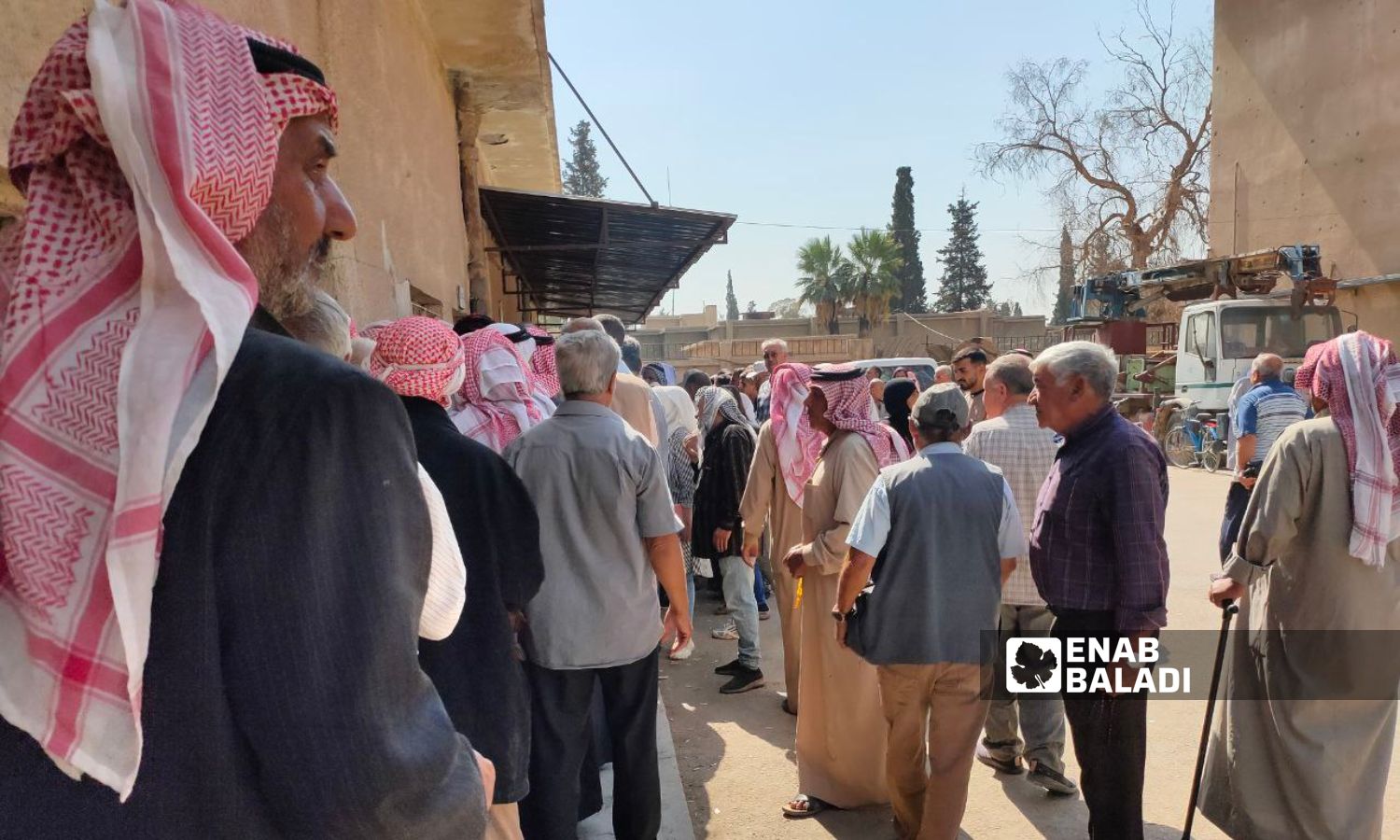



Residents of areas controlled by the Syrian Democratic Forces (SDF) are suffering from the widespread pricing of basic goods and commercial transactions in dollars, as the Autonomous Administration of North and East Syria (AANES), the political umbrella for the SDF, introduced what is locally known today as “dollarization.”
Since its implementation, this trend has become a burden on those with limited income who already face difficulty securing their basic needs due to exchange rate fluctuations and rising prices. This is especially problematic considering that salaries for workers and employees are paid in Syrian pounds, regardless of the local currency’s status.
The new pricing has created a gap between employee salaries and prices due to incomes in the local currency and the pricing of goods tied to the dollar.
Thamer al-Kirat (46 years old), a resident of the city of al-Hasakah in northeastern Syria, told Enab Baladi that he struggles with everything being priced in dollars while his monthly salary is received in Syrian pounds, making it difficult to meet daily needs due to rising prices and unstable exchange rates.
Al-Kirat works as an employee in the private sector and earns about one million Syrian pounds as a monthly salary. He believes that the value of his salary is continuously eroding because of dollarization.
Several months ago, his salary was equivalent to about 100 dollars, while today it equals 70 dollars, and exactly a month ago, it was equivalent to 65 dollars. With exchange rates fluctuating in this manner, the gap between what he earns in Syrian pounds and what he needs to spend in dollars increases.
According to Enab Baladi‘s observations, the situation seems even more challenging for day laborers whose daily income is only one dollar, as well as for public sector employees whose salaries at best amount to 35 dollars per month.
Adel, who lives in al-Hasakah and rents a house for 75 dollars per month, also suffers from dollarization, even though there is a law from the Autonomous Administration to peg house rents to the Syrian pound. However, these laws are not implemented, and it is impossible to find a house priced in Syrian pounds in the city of al-Hasakah.
He added that every month he goes to buy dollars in order to pay the rent for the house he lives in with his family of four. He manages to pay rent by relying on his brother who resides in Europe and who sends him money transfers monthly.
Pricing in dollars does not limit itself to essential goods but has also begun to prevail in the healthcare sector, posing a new challenge for the residents and distancing them from healthcare options.
Dentist Mohammed al-Ali, who lives and works in the city of al-Hasakah, told Enab Baladi that dollarization has “significantly” affected the healthcare sector more than any other. He pointed out that primary materials used in dental treatment, from anesthetics and cotton to sanitizers, are all priced in dollars, forcing them to raise prices to keep pace with the market.
He added that the price imbalance has impacted the quality of treatment. A doctor may have to use cheaper materials of lower quality to reduce costs for the patient, and it is difficult to balance quality with price. If treatment fails, the doctor is always to blame.
Enab Baladi also observed in other clinics that dental implant procedures are exclusively priced in dollars, as are cosmetic clinics and care centers.
Civilians in northeastern Syria believe that the Autonomous Administration’s decisions encourage traders and service providers to price goods and services in dollars.
From the moment goods enter Autonomous Administration areas, especially through the Semalka crossing with Iraqi Kurdistan, all fees and taxes are imposed in dollars.
Hani, the owner of a solar energy equipment sales and installation shop in al-Hasakah, withheld his full name for security reasons, told Enab Baladi that his goods come through the Semalka crossing, and fees and taxes are paid in US dollars, which forces him to price his merchandise in dollars.
These procedures apply to all traders in the region, in various fields, as observed by Enab Baladi’s correspondent during a tour in the markets of al-Hasakah.
The Autonomous Administration announces tenders and auctions in US dollars. This month, it also converted registration fees for various types of vehicles to US dollars.
Meanwhile, the Autonomous Administration provides its employees with salaries in Syrian pounds, with a minimum wage of one million Syrian pounds as the minimum wage threshold.
if you think the article contain wrong information or you have additional details Send Correction